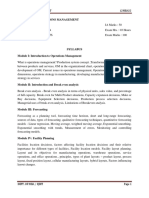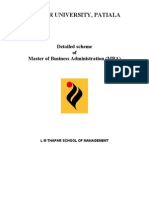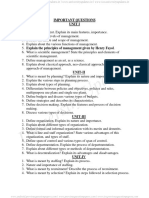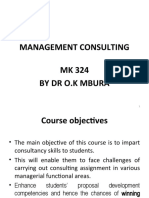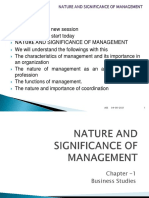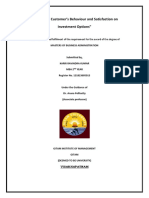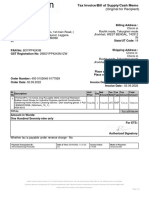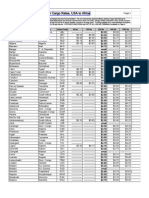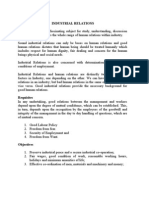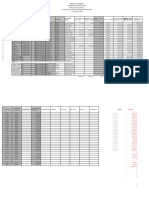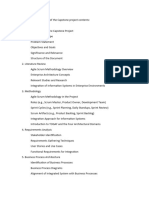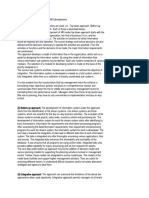0 ratings0% found this document useful (0 votes)
832 viewsMMH717 Operationsmanagement
MMH717 Operationsmanagement
Uploaded by
Sri HarshaThis document provides information on the MBA II trimester course "Operations Management". The course aims to help students understand operations management concepts through manufacturing and service examples and apply planning and control concepts. Key topics covered include operations strategy, process and product design, facilities location, capacity and inventory planning, aggregate production planning, and quality and project management. Learning activities include lectures, case studies, projects and practical work. Assessment is based on understanding of OM basics, roles of operations managers, and ability to analyze and evaluate strategies.
Copyright:
© All Rights Reserved
Available Formats
Download as PDF, TXT or read online from Scribd
MMH717 Operationsmanagement
MMH717 Operationsmanagement
Uploaded by
Sri Harsha0 ratings0% found this document useful (0 votes)
832 views2 pagesThis document provides information on the MBA II trimester course "Operations Management". The course aims to help students understand operations management concepts through manufacturing and service examples and apply planning and control concepts. Key topics covered include operations strategy, process and product design, facilities location, capacity and inventory planning, aggregate production planning, and quality and project management. Learning activities include lectures, case studies, projects and practical work. Assessment is based on understanding of OM basics, roles of operations managers, and ability to analyze and evaluate strategies.
Original Description:
OPERATIONS MANAGEMENT
Original Title
MMH717-OPERATIONSMANAGEMENT (1)
Copyright
© © All Rights Reserved
Available Formats
PDF, TXT or read online from Scribd
Share this document
Did you find this document useful?
Is this content inappropriate?
This document provides information on the MBA II trimester course "Operations Management". The course aims to help students understand operations management concepts through manufacturing and service examples and apply planning and control concepts. Key topics covered include operations strategy, process and product design, facilities location, capacity and inventory planning, aggregate production planning, and quality and project management. Learning activities include lectures, case studies, projects and practical work. Assessment is based on understanding of OM basics, roles of operations managers, and ability to analyze and evaluate strategies.
Copyright:
© All Rights Reserved
Available Formats
Download as PDF, TXT or read online from Scribd
Download as pdf or txt
0 ratings0% found this document useful (0 votes)
832 views2 pagesMMH717 Operationsmanagement
MMH717 Operationsmanagement
Uploaded by
Sri HarshaThis document provides information on the MBA II trimester course "Operations Management". The course aims to help students understand operations management concepts through manufacturing and service examples and apply planning and control concepts. Key topics covered include operations strategy, process and product design, facilities location, capacity and inventory planning, aggregate production planning, and quality and project management. Learning activities include lectures, case studies, projects and practical work. Assessment is based on understanding of OM basics, roles of operations managers, and ability to analyze and evaluate strategies.
Copyright:
© All Rights Reserved
Available Formats
Download as PDF, TXT or read online from Scribd
Download as pdf or txt
You are on page 1of 2
MBA II TRIMESTER
Course Code: MMH 717 Course Title: OPERATIONS MANAGEMENT
COURSE DESCRIPTION AND LEARNING OUTCOMES
Operations Management (OM) is concerned with the management of resources and activities that
produce and deliver goods and services for customers. Efficient and effective operations can
provide an organization with major competitive advantages since the ability to respond to customer
and market requirements quickly, at a low cost, and with high quality, is vital to attaining
profitability and growth through increased market share. Therefore, this course is designed to:
Understand the process model of operations that describes inputs being transformed into
outputs within the boundary of an operations system.
Know the role of operations managers, in particular the importance of focusing on suppliers
and customers who are outside this boundary, as well as on other aspects of the operations
system's external environment.
After studying this course, students will be able to:
S.No Learning Outcome Assessment
1 Understand the basics of operations management using manufacturing and A1
service examples.
2 Identify the roles and responsibilities of operations managers in different A1
organizational contexts.
3 Apply the planning and control concepts for decision-making A2
4 Analyse the role of operations in projects A3
5 Evaluate strategies for improvement in manufacturing and service contexts A3
COURSE OUTLINE AND INDICATIVE CONTENT
UNIT-I: INTRODUCTION TO OPERATIONS MANAGEMENT (6 Hours)
Introduction to Operations Management- Scope, Need, historical evolution of OM, Goods Vs.
Services. Input-Process-Output Model. Need for Operations Strategy.
UNIT-II: DESIGNING OPERATIONS (6 Hours)
Process design, product design, Service delivery systems. Layout Planning - Types of Layout,
Implications for layout planning, Layout Design.
UNIT-III: PLANNING AND CONTROL OF OPERATIONS –I (6 Hours)
Facilities Location – Location Decision Relevant Factors, Location Planning Methods. Capacity
Planning and Inventory Management.
49
Unit-IV: PLANNING AND CONTROL OF OPERATIONS –I (6 Hours)
Aggregate Production Planning (APP) - APP- Strategies, Master Production Scheduling –
Linkages with APP. Evolution of ERP – Developing MRP Logic- Bill of Materials (BoM), Lot
Sizing Rules, Master Production Schedule (MPS), MRP: Core Logic, Developing MRP,
V. QUALITY & PROJECT MANAGEMENT (6 Hours)
Introduction to Quality Management, Quality Philosophy, BPR and Continuous Improvement tools
- SQC.
Introduction to Project Management, Knowledge areas in the Project Management, Project
Environment, Project Life cycle.
Learning and teaching activities
Mixed pedagogy approach is adopted throughout the course. Classroom based face to face
teaching, directed study, independent study via G-Learn, case studies, projects and practical
activities (individual & group).
Teaching and learning resources
Soft copies of teaching notes/cases etc. will be uploaded onto the G-learn. Wherever necessary,
printouts, handouts etc. will be distributed in the class. Prescribed text book will be provided to all.
However you should not limit yourself to this book and should explore other sources on your own.
You need to read different books and journal papers to master certain relevant concepts to analyze
cases and evaluate projects. Some of these reference books given below will be available in our
library.
Text Book:
Heizer Jay, Barry Render, Chuck Munson & Amit Sachan 2017, Operations Management –
Sustainability & Supply Chain Management, Pearson, 12th Edition.
SUGGESTED READINGS:
1. B.Mahadevan, 2016, Operations Management theory and practice, 3rd Edition, Pearson
Education.
2. Lee J. krajewski, Larry P.Ritzman, Manoj K. Malhotra & Samir K. Srivastava 2016,
Operations Management – Processes and Supply Chains, 11th Edition, Pearson.
3. Collier/Evans/Ganguly: OM: A South – Asian Perspective, 3rd Edition, Cengage Learning
India Pvt. Ltd.
50
You might also like
- Statement 21-NOV-22 AC 03013375 23042820Document3 pagesStatement 21-NOV-22 AC 03013375 23042820Vitor BinghamNo ratings yet
- SMU MBA101 - Management Process and Organizational Behaviour Free Solved AssignmentDocument9 pagesSMU MBA101 - Management Process and Organizational Behaviour Free Solved Assignmentrahulverma2512100% (1)
- IESBA Fact SheetDocument2 pagesIESBA Fact SheetOhmpiang OhmNo ratings yet
- Accounting For ManagersDocument2 pagesAccounting For ManagersDreamtech Press33% (3)
- Supply Chain ManagementDocument71 pagesSupply Chain ManagementArslan Zulfiqar AhmedNo ratings yet
- KFC CaseDocument18 pagesKFC Caseshibanini100% (1)
- Sawyers - Introduction To Managerial AccountingDocument29 pagesSawyers - Introduction To Managerial AccountingTrisha Mae AlburoNo ratings yet
- Behavioural Aspect of ManagementDocument55 pagesBehavioural Aspect of Managementramanroy100% (2)
- Internship Final ReportDocument77 pagesInternship Final ReportSri Harsha100% (2)
- Madoff ScandalDocument7 pagesMadoff ScandalRohit GoyalNo ratings yet
- Operations Management AssignmentDocument2 pagesOperations Management AssignmentRichard LaneNo ratings yet
- Ba7201 Op PDFDocument265 pagesBa7201 Op PDFKarthi VijayNo ratings yet
- BA5211 - Data Ananlysis and Bussiness Modelling Lab ManualDocument66 pagesBA5211 - Data Ananlysis and Bussiness Modelling Lab ManualMeena SNo ratings yet
- RB Group Case StudyDocument1 pageRB Group Case Studyanand gupta100% (1)
- Brand ManagementDocument6 pagesBrand ManagementAnand DedhiaNo ratings yet
- 12mba32 Om NotesDocument68 pages12mba32 Om NotessanthoshNo ratings yet
- Concept of Random VariablesDocument4 pagesConcept of Random VariablesvjpopinesNo ratings yet
- The Manager's Job Folklore and FactDocument18 pagesThe Manager's Job Folklore and FactJose Carlos Bula100% (1)
- Final Assignment On MISDocument17 pagesFinal Assignment On MISRahul GuptaNo ratings yet
- P3 Business Analysis Section ADocument45 pagesP3 Business Analysis Section ALaura White100% (4)
- Capital Budgeting Illustrative NumericalsDocument6 pagesCapital Budgeting Illustrative NumericalsPriyanka Dargad100% (1)
- Ba4102 Management ConceptDocument56 pagesBa4102 Management ConceptrinshadpppmNo ratings yet
- Strategies of Declining IndustriesDocument14 pagesStrategies of Declining IndustriesMhiltz Ibarra De Guia100% (2)
- Managing Human Resources in Organizations: OrganizingDocument51 pagesManaging Human Resources in Organizations: OrganizingHiepdangfeelgoodNo ratings yet
- Chap 1 Managers in The WorkplaceDocument28 pagesChap 1 Managers in The WorkplaceSahar Hayat AwanNo ratings yet
- Corporate Strategy Lecture NotesDocument121 pagesCorporate Strategy Lecture Notesnonhlakanipho.mkNo ratings yet
- Executive Summary: Performance Management SystemDocument85 pagesExecutive Summary: Performance Management SystemJanhavi MahajanNo ratings yet
- Mba Syllabus Thapar UniversityDocument96 pagesMba Syllabus Thapar UniversityRahul RaiNo ratings yet
- Discussion Questions Chapter 6Document2 pagesDiscussion Questions Chapter 6Sumit TuladharNo ratings yet
- Chapter 1Document12 pagesChapter 1komal4242No ratings yet
- Question Bank - MBA - 2017-18 PDFDocument88 pagesQuestion Bank - MBA - 2017-18 PDFSumera DNo ratings yet
- Assignment of Performance ManagementDocument4 pagesAssignment of Performance ManagementParveen MaanNo ratings yet
- POM Important QuestionsDocument2 pagesPOM Important QuestionsMamilla Naveen Kumar ReddyNo ratings yet
- Roma Rani Barik 42202246 DLMBAEBECG1Document21 pagesRoma Rani Barik 42202246 DLMBAEBECG1romasonu27No ratings yet
- Goa Sahakar BhandarDocument18 pagesGoa Sahakar BhandarSimon Alan Correia100% (1)
- Strategic Alliance in SCMDocument31 pagesStrategic Alliance in SCMRajeev RanjanNo ratings yet
- Simchi Levi3E SMDocument56 pagesSimchi Levi3E SMKhang HuynhNo ratings yet
- NR KanikaDocument30 pagesNR Kanikanyk NainitalNo ratings yet
- Chapter 2 (Performance Management Process)Document10 pagesChapter 2 (Performance Management Process)shakeelakousar24No ratings yet
- Mba Sem-1 Decision Science-I - U-13Document14 pagesMba Sem-1 Decision Science-I - U-13VidyaNo ratings yet
- Financial Management Course OutlineDocument2 pagesFinancial Management Course OutlineRosenna99No ratings yet
- Supply Chain ManagementDocument76 pagesSupply Chain Managementsreejith_eimt13No ratings yet
- CH 9 Factory Overhead - 2Document43 pagesCH 9 Factory Overhead - 2Rana Umair67% (3)
- MK 324 Power Point Management Consulting CompleteDocument397 pagesMK 324 Power Point Management Consulting CompleteWILBROAD THEOBARDNo ratings yet
- Accounting For ManagersDocument14 pagesAccounting For ManagersKabo Lucas67% (3)
- Liquidity and ProfitabilityDocument9 pagesLiquidity and ProfitabilitySunday SamsonNo ratings yet
- Global Management Accounting PrinciplesDocument56 pagesGlobal Management Accounting PrinciplesNetrananda100% (2)
- CHP 13 14 PDFDocument39 pagesCHP 13 14 PDFLara HarbNo ratings yet
- Question Bank III SemDocument10 pagesQuestion Bank III SemsudhaaNo ratings yet
- Ba9221 Operations ManagementDocument2 pagesBa9221 Operations ManagementSonuSwathi0% (1)
- Business EconomicsDocument333 pagesBusiness EconomicsKiana Eden SantosNo ratings yet
- Assignments - MB0046 - Marketing ManagementDocument2 pagesAssignments - MB0046 - Marketing ManagementMehdi Hasan100% (1)
- Developing An Effective Business Model: Bruce R. Barringer R. Duane IrelandDocument28 pagesDeveloping An Effective Business Model: Bruce R. Barringer R. Duane IrelandMutiara TechnologyNo ratings yet
- Entrepreneurial and Intrapreneurial MindDocument8 pagesEntrepreneurial and Intrapreneurial MindMehul Mehta0% (1)
- 01 Nature and Significance of ManagementDocument38 pages01 Nature and Significance of ManagementMili BasNo ratings yet
- Where Financial Report Still Falls ShortDocument2 pagesWhere Financial Report Still Falls ShortJoel Swapnil SinghNo ratings yet
- Part A: Organizational Behaviour Case StudiesDocument7 pagesPart A: Organizational Behaviour Case StudiesdeepakNo ratings yet
- Management Accounting Mba BKDocument138 pagesManagement Accounting Mba BKBabasab Patil (Karrisatte)100% (1)
- Value Chain Management Capability A Complete Guide - 2020 EditionFrom EverandValue Chain Management Capability A Complete Guide - 2020 EditionNo ratings yet
- Business Leadership in Turbulent Times: Decision-Making for Value CreationFrom EverandBusiness Leadership in Turbulent Times: Decision-Making for Value CreationNo ratings yet
- Learning and Consumer BehaviorDocument17 pagesLearning and Consumer BehaviorSri HarshaNo ratings yet
- CONSUMER BEHAVIOURCOURSE OUTLINE June To Octo 2019Document5 pagesCONSUMER BEHAVIOURCOURSE OUTLINE June To Octo 2019Sri HarshaNo ratings yet
- Market StructureDocument19 pagesMarket StructureSri HarshaNo ratings yet
- Dual Mediation Hypothesis Model (DMH) Postulates That The Affective AttitudesDocument2 pagesDual Mediation Hypothesis Model (DMH) Postulates That The Affective AttitudesSri HarshaNo ratings yet
- Case MC ColleaguesVsClientsDocument2 pagesCase MC ColleaguesVsClientsSri Harsha50% (2)
- Pet Insurance BY 121823605030Document15 pagesPet Insurance BY 121823605030Sri HarshaNo ratings yet
- SM Unit 5Document4 pagesSM Unit 5Sri HarshaNo ratings yet
- SM Unit 4Document5 pagesSM Unit 4Sri HarshaNo ratings yet
- EXECUTIVE SUMMARY On Icici BankDocument24 pagesEXECUTIVE SUMMARY On Icici BankSri Harsha100% (1)
- Ganjam Nagappa Case StudyDocument5 pagesGanjam Nagappa Case StudySri HarshaNo ratings yet
- Investment AvenuesDocument37 pagesInvestment AvenuesSri HarshaNo ratings yet
- Second Assignment of Social InnovationDocument5 pagesSecond Assignment of Social InnovationSri HarshaNo ratings yet
- Marine InsuranceDocument15 pagesMarine InsuranceSri HarshaNo ratings yet
- Information Systems and Ms Excel: DrylpthoraniDocument14 pagesInformation Systems and Ms Excel: DrylpthoraniSri HarshaNo ratings yet
- FD Textbook PDFDocument44 pagesFD Textbook PDFSri HarshaNo ratings yet
- FD TextbookDocument44 pagesFD TextbookSri HarshaNo ratings yet
- AERA-2019: Airports Economic Regulatory Authority of India (Amendment) Bill, 2019Document10 pagesAERA-2019: Airports Economic Regulatory Authority of India (Amendment) Bill, 2019Sri HarshaNo ratings yet
- Consumer BehaviorDocument5 pagesConsumer BehaviorSri HarshaNo ratings yet
- InvoiceDocument1 pageInvoiceChinni MohanNo ratings yet
- B124 - Book 7 Part 2: Standard Costing and Variance AnalysisDocument40 pagesB124 - Book 7 Part 2: Standard Costing and Variance AnalysisNabil Al hajjNo ratings yet
- Onboarding FormDocument40 pagesOnboarding FormThanash KumarNo ratings yet
- Second Semester First Phase Master Teaching Timetable - 2023 - 2024Document30 pagesSecond Semester First Phase Master Teaching Timetable - 2023 - 2024mwanakawesleyNo ratings yet
- Course Syllabus: School of Business and EconomicsDocument25 pagesCourse Syllabus: School of Business and EconomicsFrancesco TrombettaNo ratings yet
- 2015 010701Document508 pages2015 010701Rsandee70100% (1)
- Memorandum and Articles of Association of CARE International UKDocument20 pagesMemorandum and Articles of Association of CARE International UKDouglas OngomNo ratings yet
- Infrastructure BondsDocument9 pagesInfrastructure BondsDipesh JainNo ratings yet
- REFLECTIONS and CASE STUDYDocument14 pagesREFLECTIONS and CASE STUDYLillyVtNo ratings yet
- Air Cargo Freight Rates From USA To AfricaDocument4 pagesAir Cargo Freight Rates From USA To Africaa2globalNo ratings yet
- Industrial Relation IntroductionDocument2 pagesIndustrial Relation IntroductionNarender SainiNo ratings yet
- LightUP Oakland ProposalDocument240 pagesLightUP Oakland ProposalCyrus FarivarNo ratings yet
- SALE of GOODS ACT, 1930 Performance of Contract of SaleDocument7 pagesSALE of GOODS ACT, 1930 Performance of Contract of SaleBiruk YidnekachewNo ratings yet
- Botswana Open University: Diploma Special STOA January-June BEL622 - Employment LawDocument6 pagesBotswana Open University: Diploma Special STOA January-June BEL622 - Employment LawTemogo DavidNo ratings yet
- Symbiosis Institute of Business Management, Pune Symbiosis International (Deemed University), Pune, IndiaDocument2 pagesSymbiosis Institute of Business Management, Pune Symbiosis International (Deemed University), Pune, IndiaCHANDAN SHARMANo ratings yet
- Republic of The Philippines Department of Education: Division of Sorsogon ProvinceDocument43 pagesRepublic of The Philippines Department of Education: Division of Sorsogon ProvinceMari CrisNo ratings yet
- Practice Exam 22-23 EBC2164 Without Solutions-1-1Document14 pagesPractice Exam 22-23 EBC2164 Without Solutions-1-1sjirandrien01No ratings yet
- BCP Capstone Project Guidelines Updated 110623Document72 pagesBCP Capstone Project Guidelines Updated 110623Joshua Alfonso PablicoNo ratings yet
- Reyes Vs TuparanDocument2 pagesReyes Vs TuparanphgmbNo ratings yet
- Information Technology Engineers Examination Registered Information Security Specialist ExaminationDocument52 pagesInformation Technology Engineers Examination Registered Information Security Specialist ExaminationzakizahirsyahNo ratings yet
- NJMJan 2017 RSPNitisharticleDocument16 pagesNJMJan 2017 RSPNitisharticlemmuneebsdaNo ratings yet
- E-Tender For AMC of Wind Turbine GeneratorsDocument37 pagesE-Tender For AMC of Wind Turbine GeneratorsraghuvarmaNo ratings yet
- Analytics at WorkDocument19 pagesAnalytics at WorkRishabh MauryaNo ratings yet
- 1396-Monthly Fiscal Bulletin 7Document18 pages1396-Monthly Fiscal Bulletin 7Macro Fiscal PerformanceNo ratings yet
- Kotler MM 16e Basic 07Document22 pagesKotler MM 16e Basic 07Muhammad AliNo ratings yet
- Discuss The Three Approaches of MIS DevelopmentDocument2 pagesDiscuss The Three Approaches of MIS Developmentndgharat100% (6)
- OSCM Case - Pizza USADocument4 pagesOSCM Case - Pizza USANguyen ChiNo ratings yet
- F050-2 AUDIT REPORT S1152.S2.9K - FinalDocument13 pagesF050-2 AUDIT REPORT S1152.S2.9K - FinalMuhammad IrfanNo ratings yet















